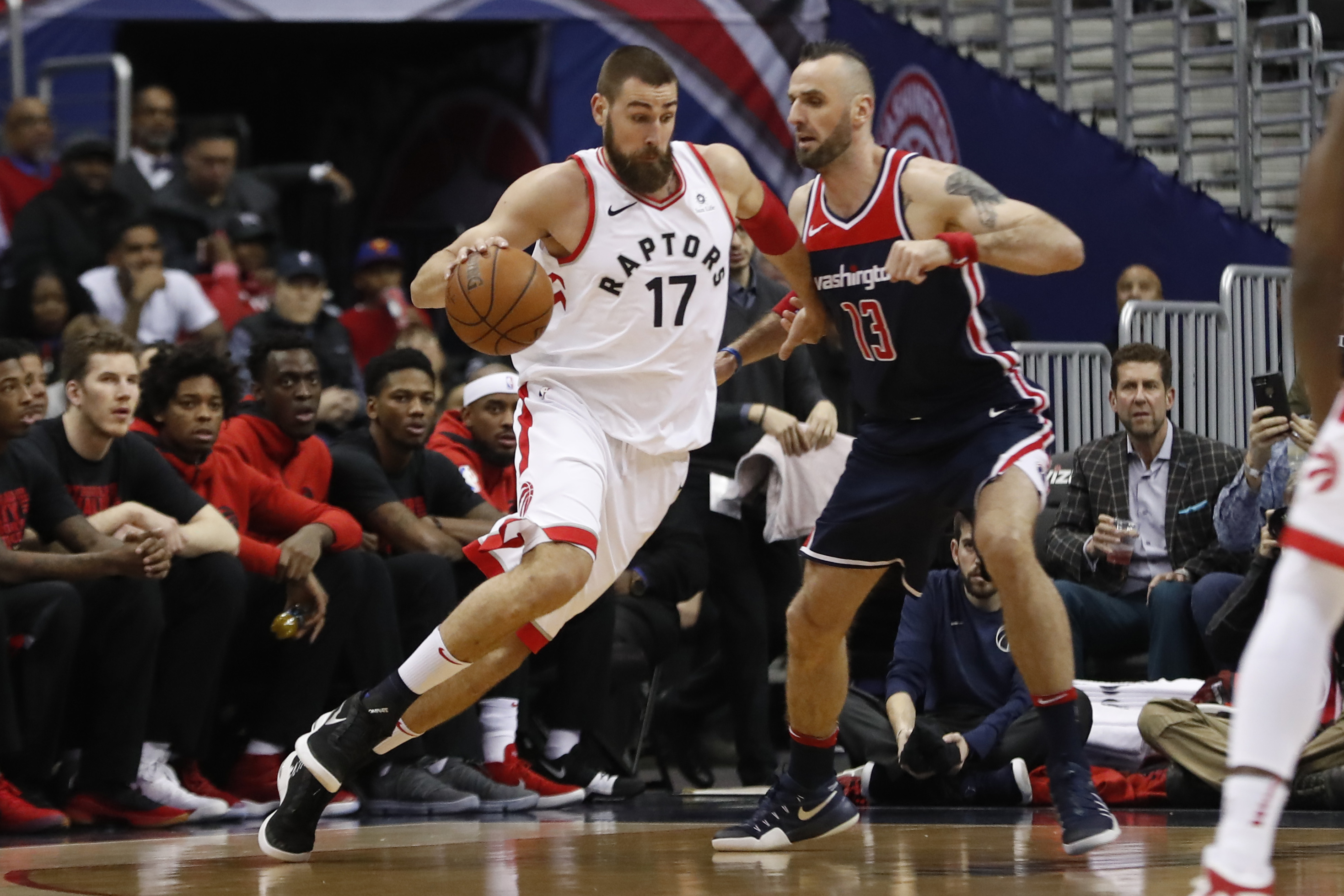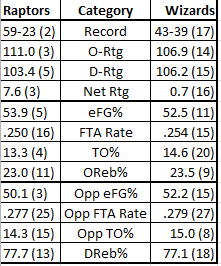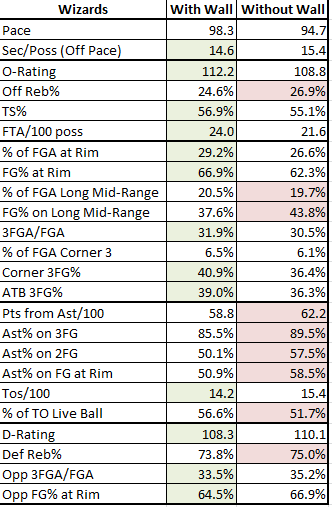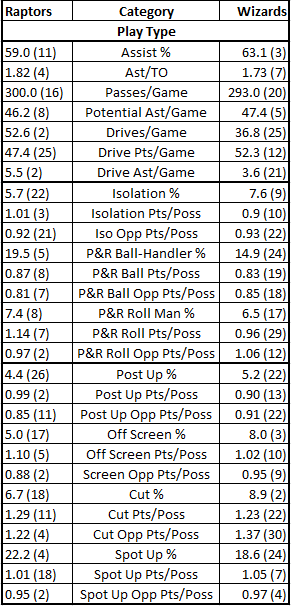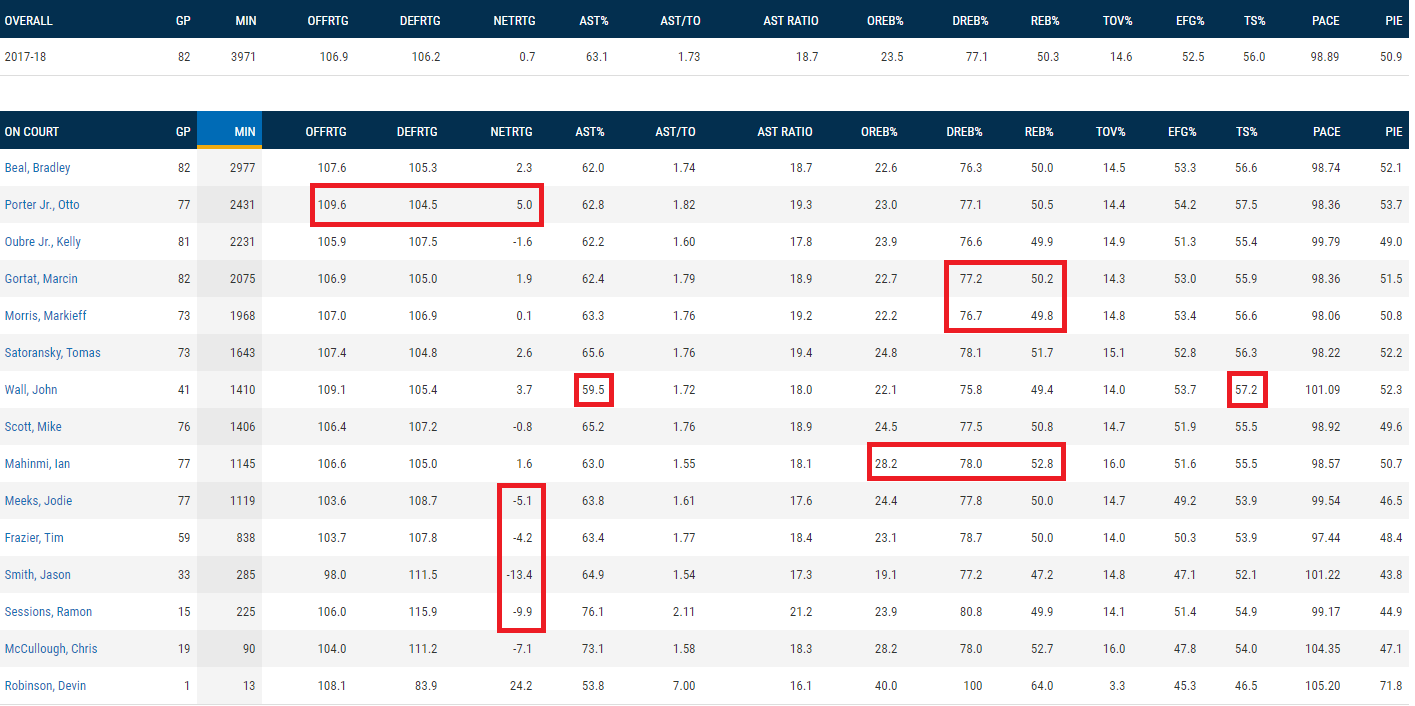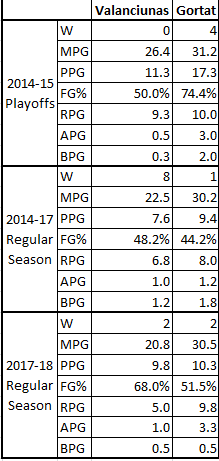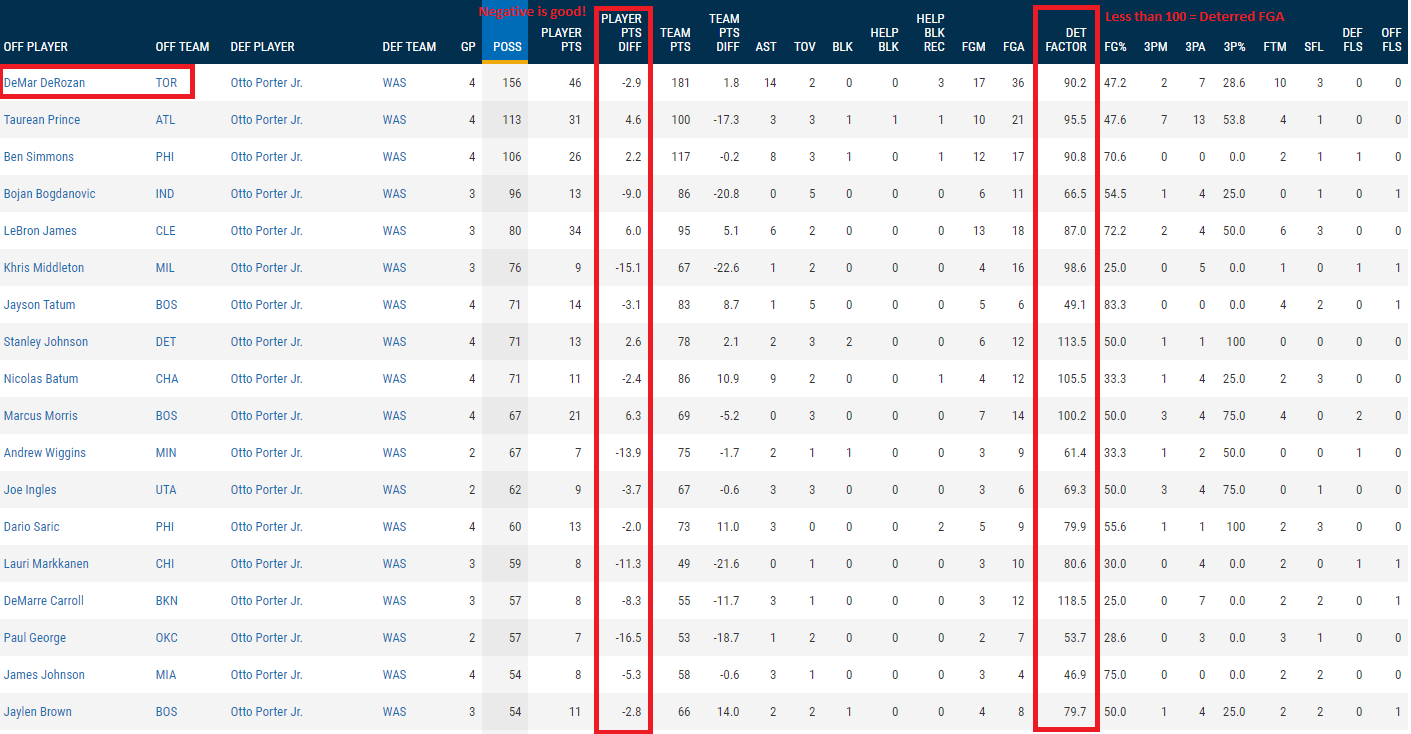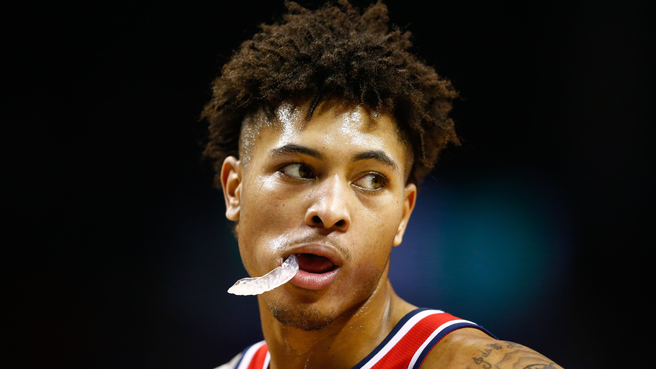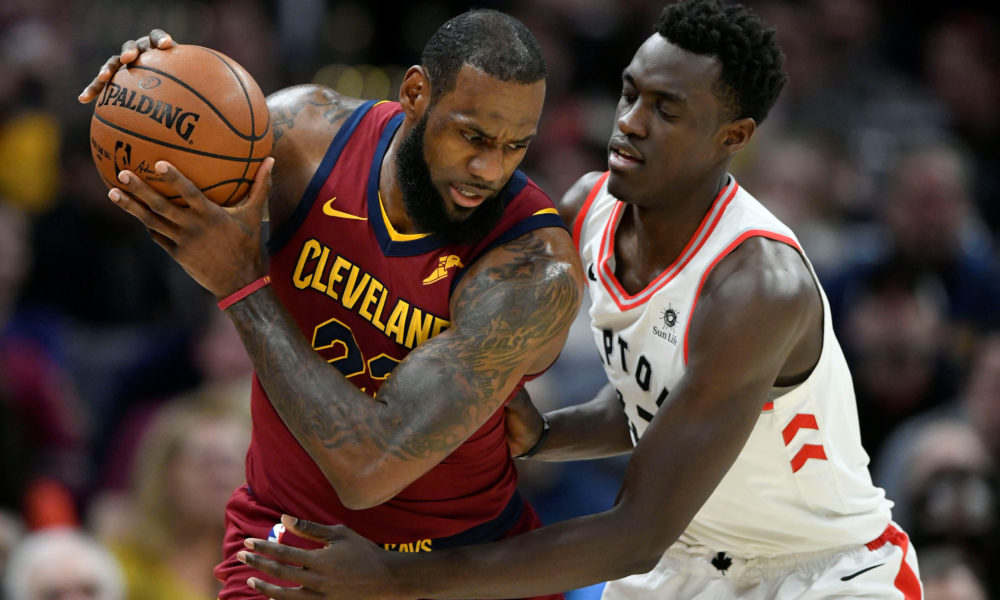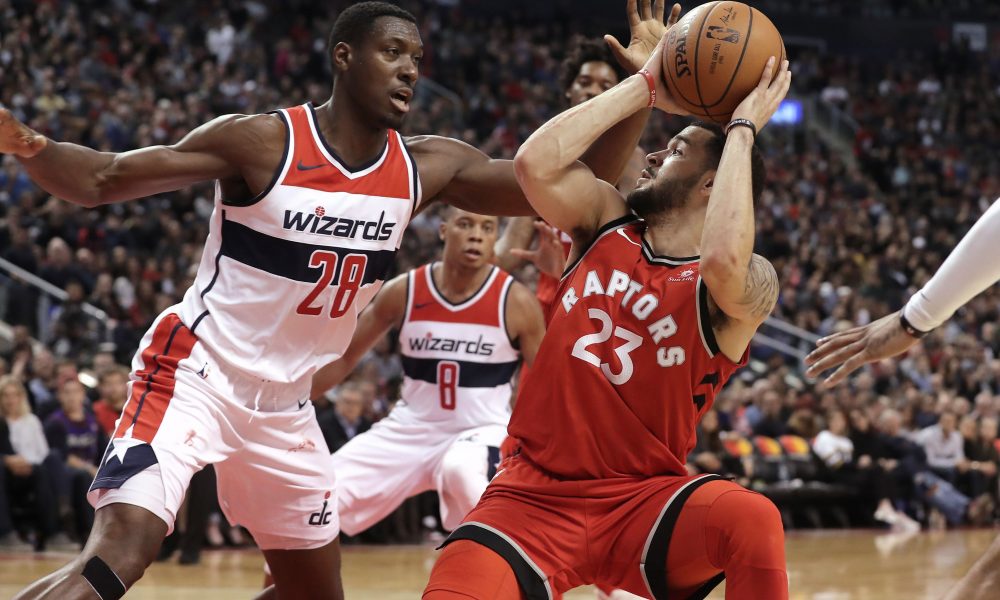The playoffs are finally here. The 59-23 Toronto Raptors drew the first seed in the Eastern Conference, and as a result they’ll host the eighth-seeded, 43-39 Washington Wizards. The series tips off Saturday at 5:30 and pits a resurgent and best-ever Raptors team against the franchise who swept them a few years back, a memory that still seems to haunt fans but isn’t shaking the Raptors much, to hear them tell it. The Wizards are incredibly talented by the standards of an eight-seed, under-performing all year in part due to John Wall missing half a season and in part due to the team playing well below their ceiling even with him. They are quite good, and though the Raptors are a strong favorite in analytical and betting terms, Raptors-Wizards should be one of the most fun (is that the word?) series of the first round.
To help set the stage for the series, we reached out to Conor Dirks, Rashad Mobley, and Kyle Weidie of Truth About It, and they were kind enough to provide deep, thoughtful answers to an annoyingly long list of questions I sent their way. Give them all a follow and be sure to check out Truth About It for the Wizards’ side of things throughout the series.
I guess we have to start where most Raptors fans, Wizards fans, and NBA writers at large went to immediately once we knew the matchup: The 2014-15 sweep. It was nearly a franchise-altering loss for the Raptors and one that still hangs over the narrative around the team, that of a “bad” playoff team despite their successes the last two years. The Raptors have gone 14-4 against the Wizards in the regular season the last five years, and still there appears to be this specter of impending and repeated doom in a rematch. At least for some. Is there a sense from the Washington side that they have a psychological advantage because of that series a few years back?
Conor Dirks: Among Washington fans, I sense that there is a belief that Washington matches up well with Toronto, and “the sweep” is a building block of that belief. I don’t doubt that the players believe they have the Raptors right where they want them. But this is a notoriously inconsistent bunch. If the Raptors win Game 1, or worse, Game 1 and Game 2…the ghost of any phantom advantage will dissipate pretty quickly. And then pool in a puddle underneath their feet. And then serve as the liquid banana peel for the team’s slipping morale. And then you’ll see Bradley Beal start saying the team just doesn’t want it enough. And you’ll notice that Gortat favorites a tweet criticizing John Wall. And John Wall will make the determination that only he can save the team, and will either hurt himself trying or unnecessarily take over a winnable game when running their regular offense would be better. A more succinct answer is: yes, there is the sense that a psychological advantage exists, but I think that everyone, from bloggers to players to fans, recognizes the frailty of that advantage, and how quickly it can be inverted.
The Wizards could probably be considered to have underperformed this season, although with a healthy John Wall they probably would have finished in the three-to-five range in the Eastern Conference. Outside of Otto Porter, nobody on the Wizards has a better Net Rating than Wall, and he very clearly raises the ceiling of this team. Has he looked back to full strength in his four games back? If not, is there faith he’ll get there with the extra rest the first round provides?
Rashad Mobley: Physically, I think Wall is fine. Sure he could benefit from more reps to get his wind up to par, but the combination of the Wizards finally having a competent bench, and the chasm of time between games during this playoff series, will give him plenty of rest opportunities. But mentally, Wall seems to be vacillating between taking over the game and playing like a man who wants to prove he is indeed needed and being the pass-first point guard this team so desperately needs. He’s found that balance in pockets, but he’s yet to hit that stride the way he so brilliantly did in last year’s playoffs. Coach Brooks has even commented that Wall needs to be much more decisive on the offensive end of the floor.
One of the well-told Wizards storylines this year was how dramatically different the Wizards offense was when Wall went down. It wasn’t as potent – Wall also ranked second to Porter in Offensive Rating – but it was certainly more democratic, the assist rate spiking and Bradley Beal taking on a greater playmaking role. Is there an ideal middle ground between those two approaches that Wall and his counterparts will be able to find, or is this going to be a case of one offense when Wall plays, and another when he sits and Beal leads hybrid bench units?
Rashad Mobley: When Wall is on, and as I alluded to earlier, it is tough to tell whether he is fully back because of the small post-injury sample size, he is LeBron like when it comes to baiting rim protectors into choosing wrong. Ibaka ,Valanciunas and the rest of the Raptors rim protectors are more likely to accrue fouls in bunches, than a blocked shot, simply because Wall (and Beal) is much more adept absorbing contact and still finishing. If the Raptors bigs leave the weak corner, Otto Porter and Markieff Morris will make them pay. Kelly Oubre, who has been mercurial as of late, not so much. The Raptors best bet would be to clog the lane and force Wall to take those mid-range shots. Sure they might fall, but if they don’t and he keeps shooting, the continuity of the Wizards offense will suffer, which benefits the Raptors for sure.
One thing I’ll be watching for from Wall is how he handles Toronto’s pick-and-roll defense, especially with Marcin Gortat as his screener. The Raptors drop their centers back to entice the mid-range shot and try to stay at home on shooters, trusting their bigs to contest well from the floater range and in. Wall, obviously, is one of the toughest point guards to employ this style against – not only has he improved as a shooter, he’s incredibly aggressive going downhill. He’s also very willing to shoot those mid-range shots, ranking in the 78th percentile or higher among guards in long mid-range volume in each of the last six years, per Cleaning the Glass. He’s an above-average finisher and elite at getting to the line, too. Have other opponents switched up their pick-and-roll coverage against him to better effect? Does a rim protector like Serge Ibaka helping off the weak corner slow him down, or is that simply too big a risk of Wall spraying to a shooter? It’s a little hard to get a read how this will play out given he’s yet to play against the Raptors’ tweaked scheme.
Conor Dirks: There’s some nuance here. When Wall first went down, the offense flowed like water under the administration of Tomas Satoransky. But teams adjusted, and things went from “everybody eats” to “the Wizards keep losing” pretty damn fast. Wall is an expert at creating assist opportunities, but could learn from Satoransky’s ability to progress a play from A to B, where B does not represent a shot attempt but instead another pass to C, and on until a high-quality shot is available. Satoransky and Wall both have great passing vision, but Wall had a tendency to overburden himself on each possession unless he could find a teammate with an immediately good look. I hope he took the right lessons from watching the team hum. I think he probably did. He’s obviously the superior player.
The Wizards aren’t necessarily bad anywhere, but they do have a pair of defensive weaknesses the Raptors may be able to exploit: They foul a lot, and they’re not great at taking care of their own glass. Ian Mahinmi is the only center on the roster with whom the Wizards rebound at even a league-average rate defensively, and his role has been all over the place. Small-ball units without Mahinmi or Gortat have bled, giving up a 27-percent offensive rebounding rate. Toronto, meanwhile, is a fringe top-10 offensive rebounding team with two centers who thrive on put-backs. Is this a trade-off Washington will likely accept for the benefits they get from playing small, or is this a big Gortat/Mahinmi series?
Rashad Mobley: Mahinmi has played well in spots this year, but you are correct, he fouls often and in bunches and it drives Coach Brooks crazy. Conversely, when the Wizards have gone small and experimented with Markieff Morris, the foul woes persist, because Morris also fouls at an amazing clip. When Morris fouls, his offense suffers, he starts chirping at the refs, and he mentally checks out. Gortat is pretty judicious with the fouls, but if he’s not engaged offensively, or if he guarding a big who roams the perimeter (like Ibaka) his lack of lateral movement is exposed. There are strengths and weaknesses abound, and Coach Brooks has a balancing act where he just tries to not let any one player drown for too long. The better Wall, Beal, Porter and Oubre play, the more the flaws of the big men are hidden.
Conor Dirks: Conor Dirks: I think what you’ll find is that, despite Gortat’s anomalous success against Valanciunas, the Wizards play long stretches of the game without him on the floor. Some of those stretches feature Ian Mahinmi, who for my money is the best player in the league if value is determined by how outrageous your failed layup attempts can be and how often you drop the ball while moving. Kinetic challenges aside, I don’t think the Wizards will try to force the Raptors to go small for significant stretches. Washington’s best non-starter lineups feature Oubre at the four, with Gortat at the five. Semi-small ball.
Sticking with Gortat, it’s hard to confuse things: He’s had Jonas Valanciunas’ number. It doesn’t make a lot of sense, really. They’re roughly physical equals, and Valanciunas is more talented where Gortat is a little nastier. Valanciunas is a much more complete player now than in 14-15, and still Gortat “won” the battles between them quite decisively this year. Do you have a better guess as to why this trend persists?
Rashad Mobley: Gortat cut his teeth as a big man by battling Dwight Howard in Orlando during practices. He’s physical, he’s nasty as you said, and he’s more a traditional big man, even though he still has a soft touch from 10-15 feet. When he has to guard players like Kelly Olynyk, Brook Lopez or Ibaka, his superpowers are neutralized as is his effectiveness. But if Valanciunas is around, Gortat is quicker, as strong if not stronger, and he’s able to return to the familiar big man role.
Looking at NBA.com’s new Matchups tool (grains of salt alert), it’s not surprising that Porter has drawn almost the entirety of the DeMar DeRozan assignment through four meetings (156 possessions, which is the sixth-highest individual matchup volume for the Raptors all year and third-highest for DeRozan). The results aren’t resounding – DeRozan scored three points per-100 possessions fewer against Porter on about 10 percent less volume – but they match the eye test that Porter makes life pretty difficult for DeRozan. That matchup, the centers, and Markieff Morris and Serge Ibaka guarding each other are probably mostly set unless switching’s needed. How do you think Washington would prefer to attack the other two: Wall on Kyle Lowry, or Wall getting to conserve a big of energy and playing free safety off of OG Anunoby? Is there another big matchup tweak I’m missing from the Wizards side?
Conor Dirks: I think that the Wizards will have Wall guard Lowry for the most part, aside from the still-too-frequent switching the Wizards do in the half court. This frees Beal to fill up the cup. You’ve probably noticed, but he’s come into his own a little bit. Beal is still not there in terms of bringing the ball up on his own, and he takes too long to make decisions with the ball. But he’s an excellent catch-and-shoot player, an improved foul-drawer on drives to the basket, and has generally infused more Dwyane Wade into his previously Ray Allen-lite persona. Wall enjoys playing against Lowry (I think the feeling is mutual in the most competitive sense possible), and so that’s where things will start. They may reassess in Game 2, depending on the outcome.
if you want an idea of what's gone on with the wizards lately… pic.twitter.com/ALieV8gs51
— William Lou (@william_lou) April 12, 2018
Perhaps the biggest question facing the Wizards is one that’s impossible to answer from the outside. Their chemistry seems…volatile. There’s been a fair amount of back-and-forth in the media, reports here and there about relationships and how the locker room works, and maybe a sense these guys don’t love playing with each other. Is all of this real? If so, how much leverage does that put on Game 1? The Raptors historically can’t win them and doing so would be a big weight off, while the Wizards seem like a Game 1 loss could threaten the locker room while an early win might be the galvanizing force they need.
Rashad Mobley: Blake my man, you have just touched on a big factor in this Wizards/Raptors series and that’s confidence. A Game 1 loss by the Raptors will surely shake the confidence of the fans and players who will be thinking “here we go again!”. If the Wizards drop Game 1, it isn’t as big of a deal UNLESS, Wall plays so-so and the ball sticks in his hand one too many times. That goes against the team ball, everyone eats mantra that worked so well in his absence, and it prevents Beal and Porter from being fully engaged.
As far as the team chemistry, it has been quite fragile this season. In the beginning, there were rumblings that Otto didn’t like the amount of shots he was getting–especially after signing a max deal the previous summer. Then Wall went out, and the Wizards hit a sweet spot and Gortat and Beal seemed to take joy out of praising the team concept now in play without Wall—which was puzzling considering how many easy basket Wall has provided for them both. Their inconsistent play with Wall back in the lineup just lends itself to even more speculation about what is going on inside that locker room, and it doesn’t help Scott Brooks is the coach. He’s a nice guy, but he’s not authoritative enough to galvanize the troops in a bind. That’s part of what made Paul Pierce such a key back in 2015. He hit the big shots, he spoke up in the locker room, and even though he was on the back nine of his career, Wall, Beal and company had to listen.
So yes, Game 1 is HUGE.
Looking at the entire series, whether it’s Xs & Os or numbers or lineup options or whatever, what do you see as the Wizards’ biggest strength in this series? Their biggest weakness?
Conor Dirks: Washington’s biggest strength is their ceiling. When Wall and Beal click, and Porter plays a healthy dose of safety valve from beyond the arc, and Oubre clamps down on (probably) DeRozan or Toronto’s best bench scorer, the Wizards are incredibly tough to beat. When one or two things go wrong, however, this team can look really bad. The team’s biggest weakness is its inability to institutionalize winning. Wall only played 41 games this season. The team disappointed against some very bad teams before he went out with an injury (but still at that point occupied a spot in the upper half of the Eastern Conference playoff picture), then surprised with some great play in the immediate aftermath before limping to the finish line. One is left to wonder what rough beast, its hour come round at last, slouches towards Bethlehem to be born?
Call it.
Conor Dirks: Raptors in 6.
Rashad Mobley: Raptors in 6. DeRozan is on a mission and the Wizards should win, but the chemistry is off right now.
Blake Murphy: Raptors in 6.


